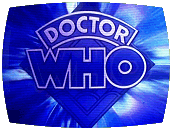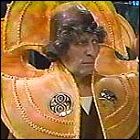 The Doctor collapses in the TARDIS as it takes him back to his home planet of Gallifrey, experiencing a vivid premonition of the assassination of the President of the Time Lords’ High Council – a vision in which he seems to play the part of the gunman. Since the Doctor’s TARDIS is a stolen vehicle, he has to evade security guards upon his return to Gallifrey, trying to reach the President to warn him of his impending fate. When the Doctor tries to stop the assassin at the fateful moment, the only thing that any of his fellow Time Lords see is that he’s the man with the weapon. The Doctor uses a legal loophole to buy enough time to find the real killer, who turns out to be his oldest enemy – but this time, the Doctor isn’t the target. The Master, struggling at the end of his final regeneration, plans to take revenge on all of Gallifrey.
The Doctor collapses in the TARDIS as it takes him back to his home planet of Gallifrey, experiencing a vivid premonition of the assassination of the President of the Time Lords’ High Council – a vision in which he seems to play the part of the gunman. Since the Doctor’s TARDIS is a stolen vehicle, he has to evade security guards upon his return to Gallifrey, trying to reach the President to warn him of his impending fate. When the Doctor tries to stop the assassin at the fateful moment, the only thing that any of his fellow Time Lords see is that he’s the man with the weapon. The Doctor uses a legal loophole to buy enough time to find the real killer, who turns out to be his oldest enemy – but this time, the Doctor isn’t the target. The Master, struggling at the end of his final regeneration, plans to take revenge on all of Gallifrey.
written by Robert Holmes
directed by David Maloney
music by Dudley SimpsonGuest Cast: Peter Pratt (The Master), Llewellyn Rees (President), Angus Mackay (Cardinal Borusa), Bernard Horsfall (Chancellor Goth), George Pravda (Castellan Spandrell), Derek Seaton (Commander Hildred), Eric Chitty (Coordinator Engin), Hugh Walters (Commentator Runcible), John Dawson, Michael Bilton (Time Lords), Maurice Quick (Gold Usher), Peter Mayock (Solis), Helen Blatch (Voice)
Broadcast from October 30 through November 20, 1976
LogBook entry & review by Earl Green
Review: Though this story is almost universally considered a classic these days, it wasn’t received well by Doctor Who fans when it was first broadcast. In previous episodes, the fleeting glimpses we’d caught of the home planet of the Time Lords gave the impression of vast, glittering spaces full of incredibly high technology (or whatever set pieces the BBC had at the time that gave the impression of such). But here, Gallifrey is a dark place, and though the Time Lords’ world is still quite advanced, the look of their technology tends toward the ancient, and their culture, examined here for the first time in the series, is steeped in unyielding, age-old tradition.
 Wisely, when it came to recasting the late Roger Delgado as the Master, the creative forces behind The Deadly Assassin went for a radical departure, portraying the character as a decaying husk instead of merely regenerating him into another actor. This was almost the only thing that could have been done that would have avoided disappointment for the audience. Peter Pratt plays the part well, but also plays it sparingly, since Goth does most of the dying Master’s footwork. The scenes regarding the Eye of Harmony and the Doctor and the Master facing off once and for all – again – were echoed strongly in the 1996 TV movie.
Wisely, when it came to recasting the late Roger Delgado as the Master, the creative forces behind The Deadly Assassin went for a radical departure, portraying the character as a decaying husk instead of merely regenerating him into another actor. This was almost the only thing that could have been done that would have avoided disappointment for the audience. Peter Pratt plays the part well, but also plays it sparingly, since Goth does most of the dying Master’s footwork. The scenes regarding the Eye of Harmony and the Doctor and the Master facing off once and for all – again – were echoed strongly in the 1996 TV movie.
I highly recommend this story for fans as well as newcomers. It’s interesting to see Tom Baker’s Doctor in a companion-less adventure, and it also single-handedly created virtually the entire Time Lord/Gallifrey mythos, though some other important pieces of that puzzle were to come later in The Invasion Of Time in 1977.

